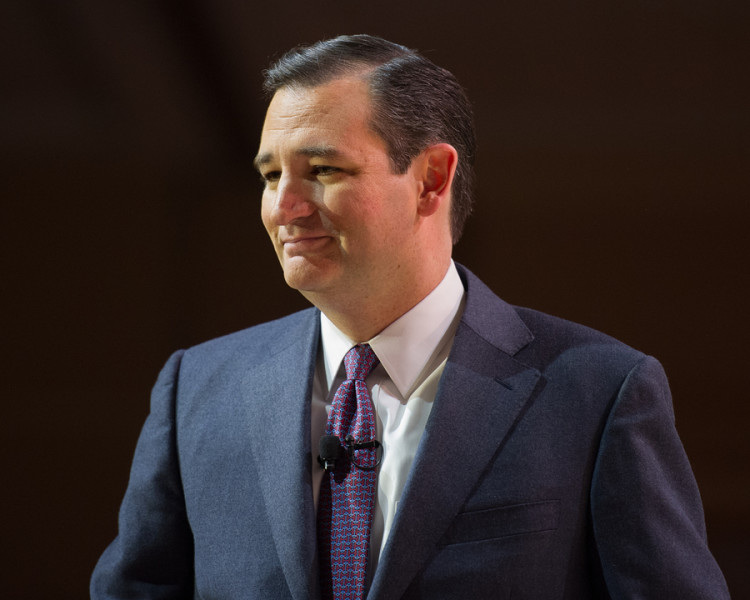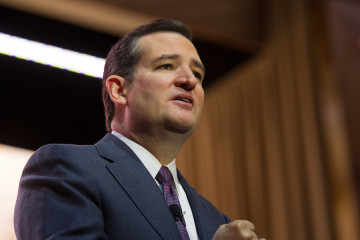Ted Cruz’s Presidential Odds Are Snowballing: Jonathan Bernstein

©2015 Bloomberg View
NZ76936S972C
NZ76936S972C
(Bloomberg View) — The Ted Cruz boomlet is thriving. Numerous pundits are weighing nomination fights that come down to Cruz and Marco Rubio, or to Cruz, Rubio and Donald Trump. And Cruz has moved up to second place, behind Rubio, in PreditIt’s prediction market.
Cruz is currently tied for second (with Rubio and Ben Carson) in national polling averages, behind Trump, and in Iowa he’s a clear second to Trump and gaining. He has raised plenty of money, and while he isn’t doing well in endorsements from members of Congress — who are widely reported to hate him — he’s doing better in the wider pool of Republican party actors. (He picked up the support of Iowa social conservative Bob VanderPlaats on Thursday.) He’s actually leading in endorsements from current and former state legislators.
But what’s improving Cruz’s chances the most is probably Trump’s continued polling strength. Many party actors would choose any of the regular candidates over Cruz. But as Jonathan Chait notes, they would surely choose Cruz over Trump if those were the only two possible choices. So the higher the chances of a Cruz-Trump showdown, the higher Cruz’s chances.
So this surge is built on some underlying strengths. But Cruz’s weaknesses still make him an unlikely nominee.
First, he has to survive eight more weeks in Iowa. The state’s conservatives have a record of jumping from one horse to another. There’s no guarantee that leaving Carson for Cruz will be their last shift of the 2016 cycle. At this point in 2011 Newt Gingrich was leading, and the eventual winner Rick Santorum was still in sixth place. And the caucuses in 2012 were on Jan. 3, a month earlier than the 2016 cycle’s Feb. 1 date.
If I had to pick an Iowa winner right now, Cruz is as good a guess as any. But if you gave me 100 to 1 odds, I’d be happy to bet on Santorum or Mike Huckabee to make an improbable late surge and finish ahead of the Texas senator. And that’s not to mention the possibility that Carson rebounds.
Cruz’s inexperience may matter, too. This is only his second run for any political office. Every nominee in the modern era of open primaries and caucuses (that is, since 1972) has contested at least three previous elections. It’s hard to tell how that will matter — John Edwards did well in 2004 with similar inexperience — but it could make Cruz more vulnerable to unexpected trouble than typical candidates are.
Even if Cruz does well in Iowa, he still needs to avoid the fate of other candidates, including Santorum and Huckabee, who did well with social conservatives there but failed to expand their support beyond that faction. Cruz will have many handicaps in doing so: He’s more aggressively a factional candidate than either Santorum or Huckabee were (he regularly attacks the rest of the party, while they mostly ignored it). And his unpopularity with those he works with means he hasn’t even been able to win endorsements from many House Freedom Caucus members.
Yes, if he winds up one-on-one against Trump, a lot of mainstream conservatives may move in his direction. But it’s still more likely that one candidate who appeals to moderates and moderate conservatives will survive the early events, whether it’s Rubio or Jeb Bush or Chris Christie or John Kasich.
In fact, even if he overcomes quirky Iowa voters and his own weaknesses, Cruz still depends on dominoes falling in precisely the correct way. He probably loses straight up against anyone but Trump. He certainly loses if any of the social conservative factional candidates stay in and run well; and he probably loses a three-candidate contest with Trump and Rubio, Bush, Kasich or Christie.
He even might not be able to beat Trump one on one if everyone else gets out. It isn’t impossible to imagine a winning path, but it’s a narrow, rocky one.
This column does not necessarily reflect the opinion of the editorial board or Bloomberg LP and its owners.
Cruz is currently tied for second (with Rubio and Ben Carson) in national polling averages, behind Trump, and in Iowa he’s a clear second to Trump and gaining. He has raised plenty of money, and while he isn’t doing well in endorsements from members of Congress — who are widely reported to hate him — he’s doing better in the wider pool of Republican party actors. (He picked up the support of Iowa social conservative Bob VanderPlaats on Thursday.) He’s actually leading in endorsements from current and former state legislators.
But what’s improving Cruz’s chances the most is probably Trump’s continued polling strength. Many party actors would choose any of the regular candidates over Cruz. But as Jonathan Chait notes, they would surely choose Cruz over Trump if those were the only two possible choices. So the higher the chances of a Cruz-Trump showdown, the higher Cruz’s chances.
So this surge is built on some underlying strengths. But Cruz’s weaknesses still make him an unlikely nominee.
First, he has to survive eight more weeks in Iowa. The state’s conservatives have a record of jumping from one horse to another. There’s no guarantee that leaving Carson for Cruz will be their last shift of the 2016 cycle. At this point in 2011 Newt Gingrich was leading, and the eventual winner Rick Santorum was still in sixth place. And the caucuses in 2012 were on Jan. 3, a month earlier than the 2016 cycle’s Feb. 1 date.
If I had to pick an Iowa winner right now, Cruz is as good a guess as any. But if you gave me 100 to 1 odds, I’d be happy to bet on Santorum or Mike Huckabee to make an improbable late surge and finish ahead of the Texas senator. And that’s not to mention the possibility that Carson rebounds.
Cruz’s inexperience may matter, too. This is only his second run for any political office. Every nominee in the modern era of open primaries and caucuses (that is, since 1972) has contested at least three previous elections. It’s hard to tell how that will matter — John Edwards did well in 2004 with similar inexperience — but it could make Cruz more vulnerable to unexpected trouble than typical candidates are.
Even if Cruz does well in Iowa, he still needs to avoid the fate of other candidates, including Santorum and Huckabee, who did well with social conservatives there but failed to expand their support beyond that faction. Cruz will have many handicaps in doing so: He’s more aggressively a factional candidate than either Santorum or Huckabee were (he regularly attacks the rest of the party, while they mostly ignored it). And his unpopularity with those he works with means he hasn’t even been able to win endorsements from many House Freedom Caucus members.
Yes, if he winds up one-on-one against Trump, a lot of mainstream conservatives may move in his direction. But it’s still more likely that one candidate who appeals to moderates and moderate conservatives will survive the early events, whether it’s Rubio or Jeb Bush or Chris Christie or John Kasich.
In fact, even if he overcomes quirky Iowa voters and his own weaknesses, Cruz still depends on dominoes falling in precisely the correct way. He probably loses straight up against anyone but Trump. He certainly loses if any of the social conservative factional candidates stay in and run well; and he probably loses a three-candidate contest with Trump and Rubio, Bush, Kasich or Christie.
He even might not be able to beat Trump one on one if everyone else gets out. It isn’t impossible to imagine a winning path, but it’s a narrow, rocky one.
This column does not necessarily reflect the opinion of the editorial board or Bloomberg LP and its owners.
Cruz could get lucky and have two of those candidates survive Iowa, New Hampshire and South Carolina. But the pressure for all but one to drop out will be strong. And Cruz could also get unlucky and have Carson or another social conservative stick around and receive votes he needs. To contact the author of this story: Jonathan Bernstein at jbernstein62@bloomberg.net To contact the editor responsible for this story: Katy Roberts at kroberts29@bloomberg.net
For more columns from Bloomberg View, visit http://www.bloomberg.com/view
For more columns from Bloomberg View, visit http://www.bloomberg.com/view







No Comment